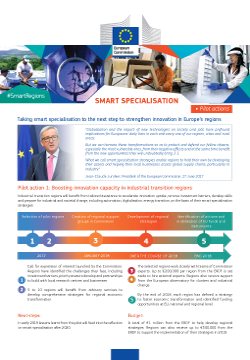Regions are invited to apply today for two Commission pilot projects. If selected, they can benefit from tailored EU financial and advisory support in transforming their economies and modernising their industries. The two pilot projects were presented by the Commission in July 2017. They aim to further help Europe's regions invest in their niche areas of competitive strength (the "smart specialisation" process) and generate the innovation, resilience and growth needed to harness globalisation. C
- 29 September 2017

Regions are invited to apply today for two Commission pilot projects. If selected, they can benefit from tailored EU financial and advisory support in transforming their economies and modernising their industries.
The two pilot projects were presented by the Commission in July 2017. They aim to further help Europe's regions invest in their niche areas of competitive strength (the "smart specialisation" process) and generate the innovation, resilience and growth needed to harness globalisation.
Commissioner for Regional policy Corina Creţu said: "There are five steps a region needs to take to haul itself up the value chain in a globalised economy; embracing innovation, digitalisation and decarbonisation, developing people's skills and breaking down barriers to investment. The pilot projects we are launching today show that the EU is ready to help its regions, every step of the way."
The smart specialisation approach was introduced in all regional policy programmes in 2014. It improved the way regions design their innovation strategies, by closely involving local businesses and researchers. The pilot projects are building on this positive experience. Two calls for expression of interest are launched today:
Call 1: Tailored support for regions facing industrial transition
Some regions have been bearing the costs of globalisation without yet reaping its benefits. They have often suffered substantial job losses and can suffer from a lack of appropriate skills, high labour costs and deindustrialisation.
Regions facing these specific challenges can apply to benefit from:
1) Tailored assistance from Commission experts organised in "regional" teams from several Commission departments. They will help regions draw up regional economic transformation strategies.
Depending on specific regional needs and assets, the Commission will hire external experts to support the work of the regions. They can be experts in financial instruments, business consultants or researchers working on advanced manufacturing processes, for example. The Commission sets aside up to €200,000 per region to cover the costs of this external expertise. The money comes from the European Regional Development Fund (ERDF).
2) Additional support from the European observatory for clusters and industrial change to help regions build cluster policies and link better local firms, research centres and academia.
3) Up to €300,000 from the ERDF to support the early implementation of the regional economic transformation strategies, subject to sufficient progress in their development.
The call especially targets "transition" and "more-developed" regions[1]. 5 regions will be shortlisted. Depending on the level of interest, the Commission may repeat the call to shortlist 5 more regions, with a new and similar budget.
Call 2: Interregional partnerships to develop competitive European value chains
The aim of this pilot project is to commercialise and scale-up "bankable" interregional projects in priority sectors such as big data, bioeconomy, resource efficiency, connected mobility, health and active ageing or cybersecurity.
Transnational partnerships of regional authorities from at least four different EU countries and involving universities, research centres, clusters and businesses can apply for Commission support in developing their projects and accessing new markets.
5 to 10 selected partnerships will benefit from tailored support by special teams established within the Commission, involving experts from several thematic departments and external experts. A total of €1 million from the ERDF will support the development of these partnerships.
Next steps:
Regions can apply until 31 October 2017. The results of the calls will be published in early December.
For More Information
- Inforegio – how to apply?
- Factsheet – Smart specialisation pilot actions
- Factsheet – what is smart specialisation?
- July 2017 Communication – Strengthening Innovation in Europe's regions
- July 2017 MEMO – Challenges ahead: boosting innovation-led growth in EU regions
[1] "Transition" regions have a GDP per head between 75% and 90% of the EU average. "More-developed" regions' GDP per head are over 90% of the EU average.
